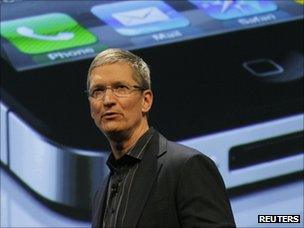Fifth iPhone expected to be launched by Apple
- Published

The launch event is the first Tim Cook will host as outright boss of Apple
Apple is expected to launch the fifth version of its best-selling iPhone today.
Journalists have been invited to a "Let's talk iPhone" event at its California campus due to start at 10:00 PDT (18:00 BST).
Doubts surround how different the iPhone 5 will be to its predecessor though some do expect big changes.
The launch will be hosted by Tim Cook, now Apple's full time boss following Steve Jobs' retirement in August.
As ever with Apple launches, exact details of product features will not be known until the event. Expert opinion is divided with some expecting significant changes.
"We're expecting a flagship, high tier product to cement the iPhone's position as the must-have device," said Ben Wood, director of research at analysts CCS Insight.
Gadget site Gizmodo took a different line and said there was only a 10% chance of seeing a new iPhone. .
Others say the cheaper model will be aimed at Asia, one of the few places where the smartphone has room for growth.
Rumours are also circulating that Steve Jobs will make a cameo appearance even though Mr Cook is expected to be the launch compere.
The event is the first since Mr Cook became official head of Apple. Before now he was an interim boss who oversaw day-to-day running of the company when Mr Jobs was on sick leave.
History lesson
The iPhone 4 debuted 15 months ago and the hiatus between that launch and today marks one of the longest periods without a new model in the history of the device. All previous versions, bar the first, have been unveiled in June.
Mr Wood said this might reflect the complexity of the task Apple set itself when getting the iPhone working the iCloud service. This acts as a network-based backup and synchronisation system for Apple's smartphones and tablets.
"The announcement is definitely more about the holy trinity of device, software and applications, and services to which iCloud adds a completely new dimension," he said.
The use of iCloud would help Apple stay one step ahead of rivals, especially HTC and Samsung, who were fast getting their own hardware to match the capabilities of the iPhone, said Mr Wood.
Apple will also be keen to put behind it the troubles that dogged the iPhone 4. Incorporating the phone's antenna into its case was blamed for causing a loss of reception. The problem led to the company offering free cases to owners to combat the reception loss.
The launch of the phone is important to Apple which is keen to capitalise on its growing share of the smartphone market. It faces strong challenges from Google's Android mobile phone operating system which, figures suggest, has become the most popular among new phone buyers in the US.
The ability of the phone to be activated and updated without connecting to a PC would help this push, said Mr Wood.
The iPhone 4's integrated antenna led many to claim it caused reception problems
One strong competitor for the smartphone market is South Korean electronics firm Samsung. It produces phones that use Android as well as models that use its own operating system called Bada.
Apple and Samsung are locked in litigation around the world over who owns the rights to use many technologies found in both smartphones and tablets.
The court room clashes have led to a ban on the Galaxy Tab 10.1 in Germany and a ban on the sales of some Galaxy smartphones in the Netherlands.
In Australia, the row meant a delay to the launch of the Galaxy Tab 10.1. In the most recent development in that row, Apple has reportedly rejected Samsung's offer of a deal to settle the case.
- Published5 October 2011
- Published4 October 2011
- Published25 August 2011
- Published27 September 2011